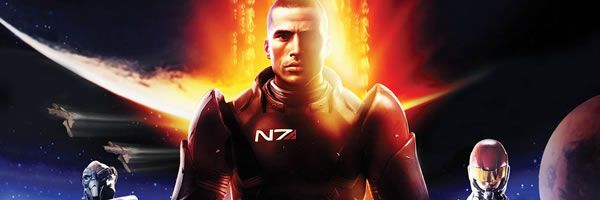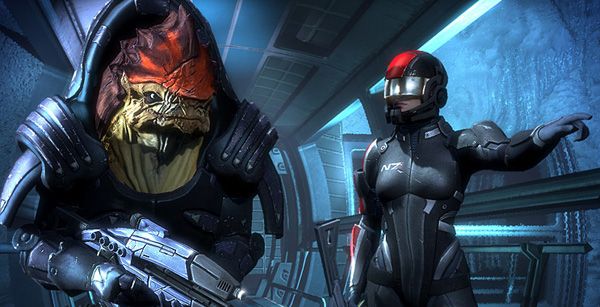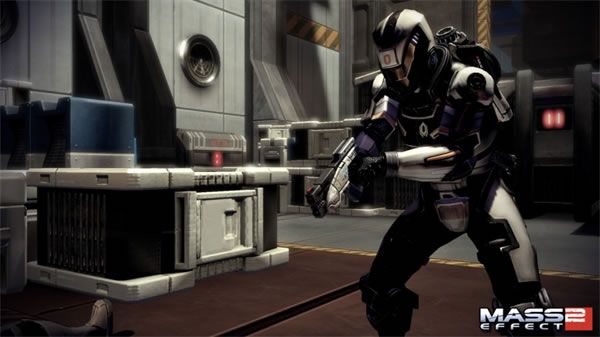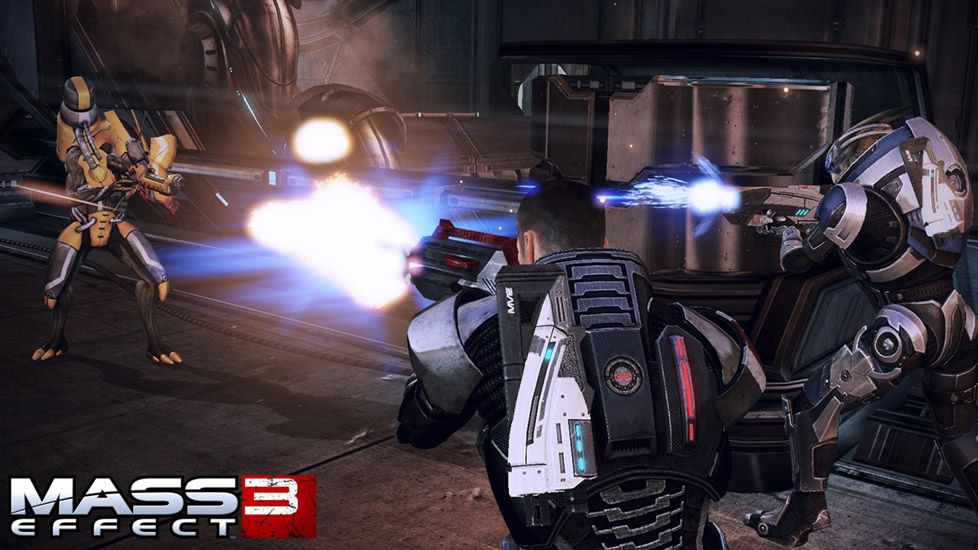When renowned video game developer BioWare unleashed its new sci-fi role playing game to the public, there was no doubt that Mass Effect was headed for greatness beyond the confines of personal consoles. It was no surprise in 2010 when Legendary Pictures, along with Warner Brothers had secured the film rights for the sci-fi juggernaut.
Sadly, tales of failed screenplays and creative differences are all we have heard since the announcement seven years ago. So, instead of trying to write our own film adaptation, why not turn to the ever-evolving landscape of television where every company and studio are vying for our depleted attention spans.
The history of sci-fi on TV is a scattered and complicated one littered with more failures than successes over the past few decades. Back in 2004, SyFy’s highly acclaimed Battlestar Galactica was labeled as not only a good sci-fi series, but one of the best TV shows ever made. Since the series’ conclusion in 2009 there has been a bit of a lull, except for SyFy’s The Expanse, which has been a pleasure to watch. While it’s great to have a show like The Expanse on for our viewing pleasure, if you compare it to other genres, like police procedurals, doctors, lawyers and even fantasy based series, the science fiction universe is sorely lacking in content.
Mass Effect could fill that space-opera void in all our hearts. The real question isn’t why the popular video game franchise should be turned into a series, but how? Video game franchises are never a guaranteed hit, whether it’s on the small screen, or in movie theaters. Just try and remember Doom and Assassin's Creed for starters. How can Mass Effect prosper where others have failed? Here are some suggestions.
Plot: War vs. Exploration
If we’re pitching this show to some network executives, they are most assuredly going to want to know what the story is about and that’s where it gets complicated. The Mass Effect universe is immeasurable and what made the first three games so interesting, was the ability of the player to makes decisions that would greatly impact the game’s outcome down the road. Basically, you and several other people could all have different outcomes depending on if you helped, hurt, or chose to walk away from a certain character. In the world of television, or any scripted medium for that matter, the stories are written in advance. This isn’t like American Idol where fans can vote on the result they would like to see.
There’s also the issue of an entirely new game launching this week called Mass Effect: Andromeda, which is an entirely different kind of story than its predecessors. In the original trilogy, you played as Commander Shepard. Shepard was a highly skilled human who enters a galactic-wide war against a sentient group of synthetics called the Reapers who come around every 50,000 years to wipe out the most developed species to maintain a balance between organic and inorganic life. It’s not a perfect system, but it’s worked so far. Choosing the “war”-driven storyline is much more suited for a serialized version of this series, where we would build the show around Shepard’s background until his inevitable confrontation with the galactic killing force known as the Reapers.
There is no denying the popularity of serialized TV shows nowadays, with complex narratives in shows like, Game of Thrones, Outlander and Vikings. All the aforementioned series are moving to an inevitable conclusion, unlike the “old-school” way of doing television, which mostly consisted of procedurals, like NYPD Blue, ER, and Law and Order. On Collider TV Talk we call these “They Solved It” shows. Over the past few years, there has been a negative stigma put on these older forms of television, but they haven’t lost all their luster yet, and would fit in nicely with the “exploration” driven plot of our Mass Effect series.
After playing the first five hours of Andromeda, there is a clear difference in tone and style from the previous Mass Effect entries. You inhabit a young Pathfinder, whose first job is that of an explorer. Unlike Commander Shepard who is a warrior through and through, Scott and Sara Ryder (your character is determined on whether or not you want to play as a man or a woman) are more akin to Captain Picard on Star Trek: The Next Generation. Sure, there will be skirmishes and bloodshed, but the siblings primary focus is finding a new habitable world in a galaxy millions of lightyears from Earth. Where Shepard was a tool of destruction, the Ryder siblings are on a quest of discovery and exploration.
Like many of the Star Trek shows, our series could consist of twenty, or so self-contained adventures, with each one starting with the discovery of a new planet, or phenomena. There can still be an “ultimate goal” of finding a new home for humanity by the series’ end, but most of the focus will be on the weekly adventures of the Ryder family and their crew. While Game of Thrones and The Walking Dead are dominating the ratings on Sunday nights, the CBS network is still the most watched and many of their series are procedurally based. So, it’s safe to say that a Star Trek: TNG-like series could work.
The Importance of Character in a Big Galaxy
For those of you familiar with any form of storytelling, you’ll know that the importance of character development is key to any great franchise. Through its first two installments, Mass Effect wonderfully crafted some of the best characters in any video game franchise. The third game struggled in this respect and if you want to know why, be sure to check out Matt Goldberg’s article on why it suffered.
From a television standpoint, creating strong characters is equally as challenging and finding the right chemistry among actors is even harder. Sticking with the sci-fi genre, Battlestar Galactica may have found lightening in a bottle with its relatively unknown cast, which was one of the best ensembles in TV history matching shows like The Wire and The Sopranos.
What’s worrisome from a space-opera perspective is when there is too much attention spent on interesting looking ships and weapons, instead of concentrating on a solid story. It’s easy to get lost in all those star constellations and pretty planets. One really must find a way to make the galaxy smaller and more relatable. If a developer can somehow find a way to tame the enormity of the Mass Effect universe into a cohesive script, then he/she better have included a group of well-rounded individuals to lead the show. Since Andromeda has just come out, let’s focus on our war-driven series where Commander Shepard’s fight against the Reapers is front and center.
Mass Effect 2 had the best collection of characters in the franchise, so far. One of these characters, who would make an excellent addition to our show was named Thane Krios. He’s an amphibian-like alien who’s one of the best assassins in the galaxy. What made him such a complex person was not his deadly use of weapons, but his longing to have a better relationship with his son. Thane unfortunately was diagnosed with a terminal disease with no cure in site. He joins Shepard’s crew in a quest for redemption, hoping to do some good before his untimely death. It’s characters like this and many more that make the series so memorable. Some people don’t like science fiction due to the strange looking creatures that inhabit the screen, but when you humanize them by giving them stories we can all relate to, people start to look past the strange makeup.
Whether the new series focuses on war or exploration, the story is going to need compelling characters, no matter what.
Choosing the Right Network
This is the fun part. We have our plot and we have our characters outlines all ready for the executives, so where do we share our amazing ideas? Well, that depends on what kind of story you’re looking to tell. Of course, we want to tell a well-thought out science fiction epic, but “how” is a different story. Let's assume this is the kind of story that ignites interest from multiple networks rather than something that's looking for any home.
Looking back on our two main ideas from a story perspective, if you want to do a more procedurally based show like the old-school Star Trek adventures, then you might want to stick with the major networks, like FOX and CBS. If the serialized war-driven story from the original trilogy is more your thing, then let’s head over to either Netflix or HBO. Netflix has done an incredible job of delivering high-quality narrative content with series such as Stanger Things and The OA. Even if a series doesn’t pan out, Netflix still puts their all into any project they approach. Marco Polo was one of the most expensive series in history for its first two seasons and even though it ended up being canceled, the production value was stellar.
For my money, HBO is the place for me. Sci-Fi is a genre that’s relatively new to the network. With the highly successful release of Westworld, it’s safe to say that they are looking for more science fiction projects at the moment. Also, HBO is a place that doesn’t rush their creators. For instance, Westworld season 2 won’t be back until 2018 due to the amount of time production takes. If this were a show like The CW’s Arrow, the series would only have five months in between seasons. Mass Effect is one of those stories you don’t want to rush.




